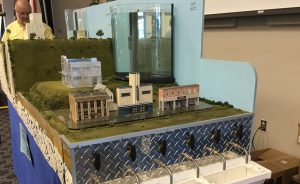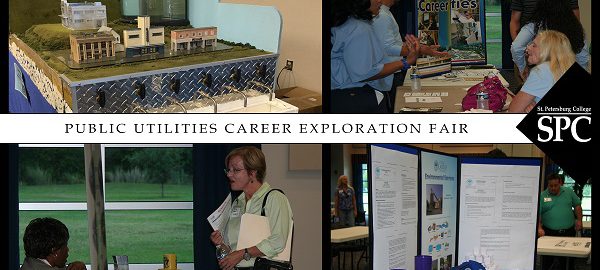St. Petersburg College Seminole Campus featured Public Utilities for its most recent job exploration fair! Currently, 2,500 job openings exist for the City of St. Petersburg, and a large portion of those jobs involve water treatment.

Water treatment, a public service, encompasses many areas of expertise that all collate to one enormous goal: provide safe drinking water for a population. Chemistry, math and physical ability all play a role in getting water from the processing plant to a customer’s faucet, and it is a prime reason why most who work in the field find it challenging yet extremely satisfying. Though the satisfaction rate appears high in the career, the managers of many water treatment plants are having a hard time finding new and promising individuals to fill positions.
“First off, it is hard because you don’t realize that this career is available,” said Waunda Barcus, Manager of Treatment and Distribution in the Water Resources Department in St. Petersburg.
And to most, the career choice does not come up. There is no set degree for Public Utilities, and the way to progress involves many hours of on the job training plus certifications.
“It took 2,080 contact hours – a years’ worth of experience – plus passing the tests to be considered an operator in training,” said Waunda.
Though the road is hard, the job has many benefits. One such benefit is working within a career that helps many people. Providing drinkable water to a city means those at the water treatment plant are the shield against many diseases that come from unfiltered water. They are the ones who make it so your child can drink from the faucet with little worry. That is a goal to be proud of.
“Make those relationships that later end up in a job offer.” – Sandy DeCarlo, Outreach Specialist at SPC
“Most people don’t realize where their water comes from, I didn’t even realize it till I worked in the plant,” said Mariam Brownal, a Chemist at the Cosme Water Plant in St. Petersburg.
Chemists, operators, electricians, mechanics and IT personnel make up the day to day crews that keep water treatment plants open. The wide variety of specialties offers solid job growth as well as working in an industry that will never disappear.
“Since potable water is a critical resource, it will never go away. There will always be jobs, and there will always be a need for people in this field,” said Mariam.

Wayne Shownfell, Chief Operator at the Cosme Water Plant for St. Petersburg, understands the hardship of getting into the field. His advice? “Get your certifications done in water treatment. Before you get your license, you have to have a certain amount of hours on the job. If someone gets the certifications, it shows us that they are motivated at continuing their career,” he said.
In the state of Florida there are three licenses one can strive for, and once completed with the hours for on the job training, certifications and testing; you are qualified to apply for an Operator C license (the first in the series). After more experience, contact hours and more testing; you may qualify for Operator Licenses B then A. This steady progression offers a career’s worth of knowledge and education in a fast paced job environment!
Sixty percent of students enrolled at SPC are female, and one of the goals behind this career exploration fair was to make women aware of the opportunity. Waunda, a woman in the predominantly male field, shared her incredible story of the hurdles she faced during her upward climb to the top.
“Most men thought the work was too hard for a woman,” she said.
But she persevered. She struggled through the schooling as a single mother raising three kids, working graveyard shifts and driving two hours to and from work. In the end, her hard work paid off.
“I drove a school bus, bartended, waitressed on the weekends,” she said. “Women need to just keep going on.”
Leah, a former Business Management major at SPC who is looking to change into something environmental, attended the career expo. She enjoyed the networking opportunity.
“This is my first career expo, and it has been very helpful. I’ve been able to get the information I need and get an idea of what these types of jobs require,” she said. “It’s definitely a consideration.”

